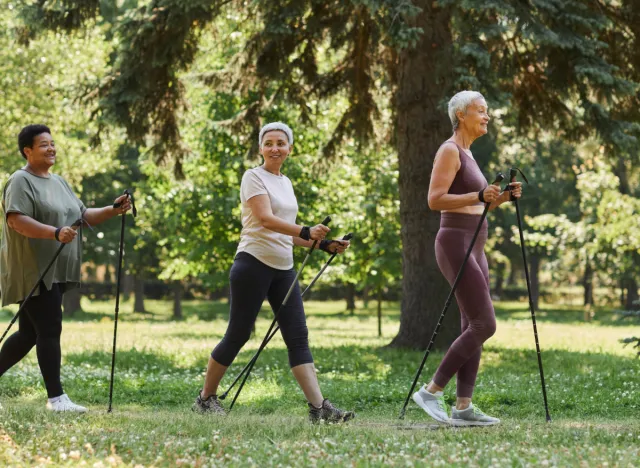One Simple Mental Health Trick You Should Never Not Do, Say Experts

If you're a practical-minded person who likes to be told clear, concise, and hyper-specific instructions when it comes to self-improvement, you'd be forgiven for finding some of the mental-health advice you encounter online a tad frustrating. "Practice more self-care…" "Try to sleep more…" "Look for the things in your life that have meaning…" Sure, it's all true, but couldn't we all use something a little more actionable that we can add to our to-do list?
Well, if you'd like to take one major step towards bolstering your mental health—and you're yearning for something far simpler and concrete to add to your daily to-do list that is entirely backed by scientific research—consider one crucial, simple, and ultimately life-changing tip that anyone can do, assuming they're not 100% confined to a city with no access to any foliage or public parks:
Take a 20-30 minute walk in the woods.
Seriously. Studies have routinely shown that just small amounts of exposure to nature—even for just a few minutes—can do wonders for your stress levels, your body, and your state of mind. Remember: You don't have to go camping for days on end or to hike the Appalachian trail to reap the mental-health benefits of nature. Sue Stuart-Smith, a British psychiatrist and author, often prescribes small walks in the forested areas to her clients. She advises them to "take as much exercise as possible, but always take it in a green setting if they can," she explained to AARP. "It's immediate; within minutes of being within a green setting, [they'll have] a lowering blood pressure."
For more on the benefits of doing this one simple thing every day, read on. And for more on the benefits of a daily stroll, don't miss the One Secret Reason You Need to Walk More Starting Now, Says Science.
Yes, Your Stress Essentially Evaporates

According to a 2019 study published in Frontiers in Psychology, spending only 20 minutes in nature will send your stress hormones levels plummeting. For the study, the researchers recruited nearly 40 volunteers who were asked to spend time in nature, where they either walked or simply sat down, for at least 10 minutes, 3 days per week for two months. Their cortisol levels were measured by saliva sample before and after their bouts with nature.
"Spending at least 20 to 30 minutes immersed in a nature setting was associated with the biggest drop in cortisol levels," observed Harvard Medical School. "After that time, additional stress-reduction benefit accrued more slowly. Time of day and specific settings didn't affect stress levels. So the next time you need to de-stress or just work on your mental well-being, find a nature setting you enjoy and spend some time there." For more great ways to bolster your mental health, don't miss the Secret Side Effects of Exercising Just 30 Minute Per Day, Says Science.
It Works As a Natural Pain Relief

"Nature helps us cope with pain," write the health experts at the University of Minnesota. "Because we are genetically programmed to find trees, plants, water, and other nature elements engrossing, we are absorbed by nature scenes and distracted from our pain and discomfort."
Natural has healing powers, as well. According to a now-famous and oft-cited study published in the 1980s in the journal Science, people who were recovering from surgery at one Pennsylvania hospital who had simply a view of trees actually healed faster than those who were staring at a brick wall. What's more, those with a view of nature required less pain medication.
You'll Feel More Connected to Other People, As Well

One study conducted by researchers at the University of Illinois found that those who lived in an urban public housing area with access to green space experienced much stronger connections to those around them than those who didn't have such access. The residents with green access "reported knowing more people, having stronger feelings of unity with neighbors, being more concerned with helping and supporting each other, and having stronger feelings of belonging than tenants in buildings without trees," observe the health experts and U Minn. "In addition to this greater sense of community, they had a reduced risk of street crime, lower levels of violence and aggression between domestic partners, and a better capacity to cope with life's demands, especially the stresses of living in poverty."
You'll Sleep Better

According to Professor Marie Murphy, the dean of postgraduate research and director of the Ulster Doctoral College at Ulster University, taking a morning walk, specifically, is a surefire way to reset your body clock, which will do wonders for your sleep.
"Because our clocks run longer than 24 hours, it's important to reset your body clock every morning with exposure to the morning's blue light, which our receptors are especially sensitive to," Michael Mosley, M.D., and host of the BBC Radio 4 podcast "Just One Thing," explained. "Light helps to reset our internal body clock. Exposure to light also suppresses the production of melatonin, the hormone that encourages us to go to sleep." For more on the amazing benefits of exercise, don't miss This Major Side Effect of Walking More, According to a New Study.
Negative Thoughts Quiet Down

Beth Collier, M.A., MBACP, the founder of the Nature Therapy School, which instructs psychotherapists on outdoor therapy with their patients, explained to the The Guardian one of the best benefits of walking in nature. "The part of the brain that is responsible for ruminative and negative thoughts—the subgenual prefrontal cortex—has been shown to quieten when we connect with nature, which gives people more space to process their problems," she said. And for more reasons to get your stress in check, see here for The Crazy Things Your Stress Does to Your Body, Say Top Experts.








